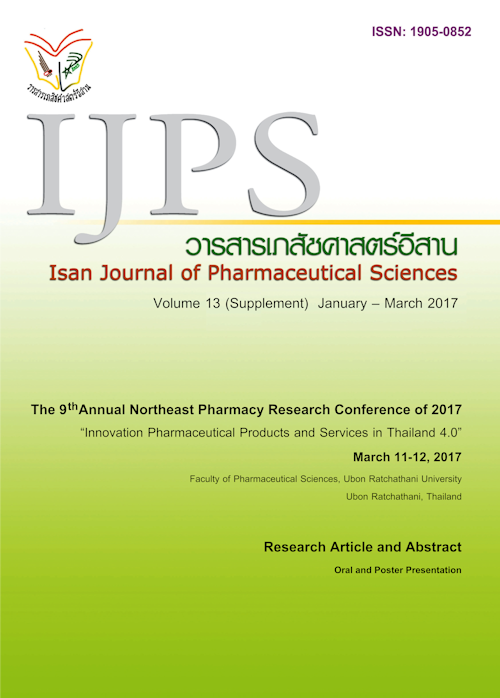A study of drug dosing adjustment initiative in patients with renal impairment admitted to internal medicine wards
Main Article Content
Abstract
Introduction: Drug dosing errors are common in renally impaired patients. Appropriate dosage adjustment is important to ensure patient safety and to avoid adverse drug effects or poor outcomes. The objective of the present study was to assess the pattern and number of the inappropriate dosage adjustment in hospitalized patients with renal impairment to improve future renal dosage adjustment guidance. Methods: The prospective study was conducted in patients with renal impairment from August to October 2016 at Internal Medicine wards of the Sunprasittiprasong Hospital. Inappropriate dosage adjustment was reported by using descriptive statistics. Results: 1,235 patients were evaluated. The study found 180 patients (14.6%) had renal impairment. 21out of 180 patients (11.7%) with renal impairment received inappropriate dosage regimens. The study also found that 232 medications required dosage adjustment. 211 (90.9%) medications were renally adjusted appropriately while 21 (9.1%) were inappropriately adjusted. Of the 21 pharmacist recommendations, physicians accepted a total of 14 (66.7%). Conclusion: The study identified a number of renal impaired subjects who received inappropriate dosage regimens. The two most common drug classes that were not renally adjusted appropriately are antibiotics and cardiovascular drugs. Therefore, this renal dosage guidance may be useful to improve future renal dosage guidance to be used in other medical units.
Article Details
In the case that some parts are used by others The author must Confirm that obtaining permission to use some of the original authors. And must attach evidence That the permission has been included
References
Chutinara W, Thongsodsaeng S, Khanthahat S. Outcome of Adjustment dosage of antibiotics in patients with renal impairment. Thai Journal of Hospital Pharmacy. 2012; 22(2): 96-105.
Hassan Y, Al-Ramahi RJ, Aziz NA, Ghazali R. Impact of a renal drug dosing service on dose adjustment in hospitalized patients with chronic kidney disease. Ann Pharmacother. 2009 Oct; 43(10): 1598-605.
Falconnier AD, Haefeli WE, Schoenenberger RA, Surber C, Martin-Facklam M. Drug dosage in patients with renal failure optimized by immediate concurrent feedback. J Gen Intern Med. 2001 Jun; 16(6): 369-75.
Joosten H, Drion I, Boogerd KJ, et al. Optimising drug prescribing and dispensing in subjects at risk for drug errors due to renal impairment: improving drug safety in primary healthcare by low eGFR alerts. BMJ Open. 2013; 3(1).
Matzke GR, Aronoff GR, Atkinson AJ Jr, et al. Drug dosing consideration in patients with acute and chronic kidney disease-a clinical update from Kidney Disease: Improving Global Outcomes (KDIGO). Kidney Int. 2011 Dec; 80(11): 1122-37.
Mehta RL, Kellum JA, Shah SV, et al. Acute kidney injury network: report of an initiative to improve outcomes in acute kidney injury. Crit Care. 2007; 11(2): R31.
Ingsathit A, Thakkinstian A, Chaiprasert A, et al. Prevalence and risk factors of chronic kidney disease in the Thai adult population: Thai SEEK study. Nephrol Dial Transplant. 2010 May; 25(5): 1567-75.
Via-Sosa MA, Lopes N, March M. Effectiveness of a drug dosing service provided by community pharmacists in polymedicated elderly patients with renal impairment a comparative study. BMC Fam Pract. 2013 Jul 13;14:9


